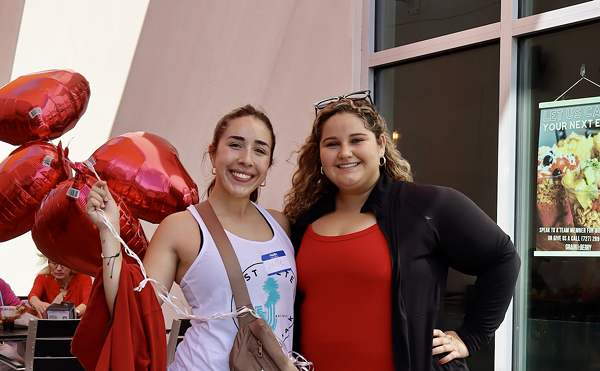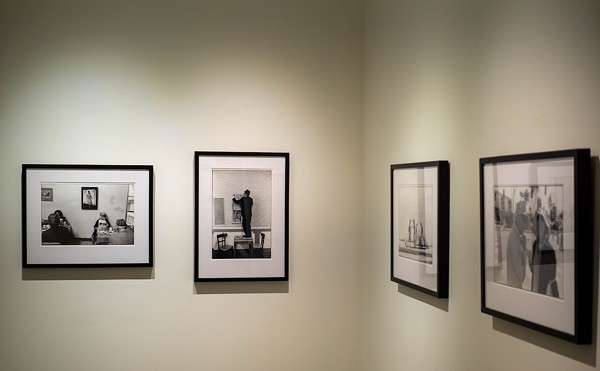4 Stars
Urbanite Theatre, 1487 Second St., Sarasota. through Nov. 15. 8 p.m. Wednesday-Saturday, 2 p.m. Sunday.
$24, students with I.D. $5. 941-321-1397
There are several ways to interpret Anna Jordan’s provocative and resonant Freak, currently showing in a tiptop production at Sarasota’s Urbanite Theatre.
On a non-moral level, the play could simply be illustrating how a 15-year-old girl knowing next to nothing about sex might turn into a 30-year-old stripper, taking on four men at a time in a private party gone haywire. Or the play might be a warning: it might be saying that in a still-patriarchal society, women too easily let men dictate their sexual histories, whether at the outset, when the pressures are from boyfriends and schoolmates, or into maturity, when male demands can lead to sexual mischief far beyond anything really desired.
But it’s a third interpretation that seems most right to me: Freak, according to this view, is aimed at men more than women, and is saying, “Your fantasies about females are dehumanizing and de-psychologizing. When you’re 16, you ignore the innocence and confusion of your girlfriends, and when you’re 30, you mistake self-hatred and masochism for sexual playfulness.”
If this perspective is right, Jordan has a resolutely moral message to get across to men, and it’s not one we want to hear. After all, those letters to Penthouse always assume that the bimbo in bed with the football team does her acrobatics out of pure frivolity; they don’t want us to think that what drives her is her deathwish.
Well, here comes Freak with its message that that’s precisely what’s implicated, that it’s not a healthy impulse that turns Daddy’s little girl into a prostitute. I can’t think of another play — or film — that makes this point so successfully. For this and for many other reasons, I recommend it to readers.
The play begins in ambiguity. Two women lie in bed together but are unaware of each other’s presence. First we meet Leah, a 15-year-old beginning, with the help of her boyfriend Luke, to experiment with sex. Her language, like that of the other female, is explicit and uncensored: we hear everything about her adventures from her surprise at the look of Luke’s genitals to her gentle complaint when he climaxes too soon.
Interwoven with these discoveries are the monologues of the other woman, 30-year-old Georgie. Her story is of a breakup with a lover, a period of confusion followed by her decision to take a job as a stripper. As Leah naively and tentatively finds her way through her first amatory experiences, Georgie tells us, with remarkable candor, how she decided one evening to go home with four men celebrating a bachelor party. The orgy that follows is carefully detailed, and its aftermath of shame and emptiness is also narrated eloquently.
Then, after more than an hour during which the two females have failed to notice each other, a real dialogue begins. Leah and Georgie know each other, it turns out. Both are real; both are human; both are nothing like the fantasy. Leah asks Georgie to explain herself, to give some advice — then the play is over.
And our minds go to work: why these two stories, why this ending? One thing we’re sure of is that both actresses are superb. As Leah, Ellie McCaw is distressingly uninformed, no more a sex fiend than your little sister, all hesitation and worry and good-natured curiosity. She looks at a Playboy for clues to her future, wears pajamas (designed by Becki Leigh) just one step more adult than a toddler’s, and admits that she’s only enjoyed the start of a beginning of an orgasm.
As Georgie, Summer Dawn Wallace is in many ways her opposite: energized by the idea that she can make total strangers lust for her at the strip club, enthusiastic when she chooses to go home with four men, then strung out and wasted in the dreadful morning after.
The characters, beautifully directed by V Craig Heindenreich, live out their stories on a set (designed by Kirk V. Hughes) mostly composed of a central bed behind which towers a wall of used clothing and bric-a-brac (a lifetime of stains and castoffs?). The evocative lighting is by Ryan Finzelber, and the ominous sound design is by Rew Tippin.
I’ll be thinking about Freak for many weeks to come. It’s that sort of play — telling us almost everything we need to know except for its meaning. But even if you disagree with my view of its significance, one point is clear: this is a song of innocence and experience, a song all of us know. See it and come to your own conclusions. It deserves your attention.















